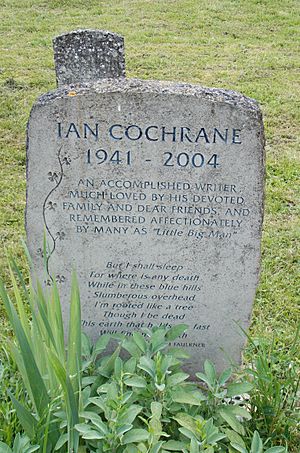Ian Cochrane (novelist) facts for kids
Ian Cochrane (born November 7, 1941 – died September 9, 2004) was a British writer of novels. He also taught creative writing. His books are known for their dark humour and often have sad endings.
Contents
About Ian Cochrane's Life
Ian Cochrane was born in Moylarg, Northern Ireland. He grew up in the countryside of County Antrim. He once shared that his family lived in a small country house. Seven people shared one bedroom. He later said he didn't realize they were poor at the time.
After World War II, his family moved to a new "council house." These were homes built by the local government. Ian still went to his old two-room country school. There was a female teacher for younger kids. A male "master" taught the older students. This master was R.L. Russell, a writer himself. He encouraged young Ian to write. This helped Ian gain confidence and aim for a better future.
In the late 1950s, Ian moved to London. He tried different jobs before becoming a full-time writer. His stories started appearing in magazines. These included Faber's Introduction 4 (1971) and Penguin Modern Stories (1972). Ian's first novel, A Streak of Madness, came out in 1973. His second book, Gone in the Head (1974), was a finalist for a big writing award.
Many parts of his early life appear in his novels. But he said his books were not just about himself. He explained that he drew from his own experiences. He felt his writing came naturally, like playing a musical instrument. He said that when he worked hard, his typewriter could not keep up. All the feelings and conversations flowed through him.
Ian taught creative writing for a while. He was even working on a book about it. However, he wondered if writing could truly be taught. He believed that if someone had talent, it could be encouraged. This was how his own teacher had helped him. Many people said he was very generous. He always offered help and advice to others.
Family Life and Beliefs
Ian married Maggie Ogilvie in 1972. They separated in a friendly way in 1979. Maggie later remarried Charles Manicom. She had a daughter named Charlotte. Ian remained a close friend to Maggie. Charles Manicom was happy for Ian to stay part of the family. Ian helped raise Charlotte. They were very close. This arrangement showed the kindness and love of everyone involved.
Ian Cochrane did not follow organized religion much. He especially disliked groups that tried to force their beliefs on others. Later in his life, he became interested in Buddhism. But he was mostly a humanist. This means he focused on human values and reason.
Ian would help friends and anyone in need. Sometimes, this put him at risk. In 1987, he was at a subway station late at night. He saw a group of men attacking two others. He said many people were just watching. He felt the attackers might have killed one person if he had not stepped in. Ian got badly hurt in this incident. His injuries affected his ability to write for a long time.
Later Years and Legacy
Despite health problems and losing his eyesight, Ian kept writing. He continued to create novels. This was even when it became harder to publish unique books.
Critics always liked Ian Cochrane's novels. A new edition of his book F for Ferg came out in 2018. There was a special event at the Seamus Heaney HomePlace. They discussed Ian's work there. His friend Maurice Leitch, writer Jan Carson, and academic Eamonn Hughes took part. His later books were harder to publish. By the time he passed away, none of his works were in print.
Ian Cochrane had a special voice in British fiction. He was known for showing the feelings of people who felt left out. These included young people, the unemployed, and those who seemed different. His books showed how these characters clashed with parents, priests, and officials. He revealed the silly and selfish sides of those in power.
Ian Cochrane's Novels
His book titles often had a funny, wild feel. Examples include Jesus on a Stick (1975) and Ladybird in a Loony-bin (1977).
Notable Works
F for Ferg (1980) is a typical Cochrane novel. It follows some young men who hang around factory gates. They look for ways to have fun. They decide to play a trick on the boss's son, Fergus. They try to set him up with someone else's girlfriend. The story starts out funny. But it ends with very serious consequences.
Another classic novel by Ian Cochrane is The Slipstream. This book is about a group of friends. They try to steal from the poor-box in a local church. One of them distracts the priest with long, fake confessions. This novel also ends with the characters facing more trouble than they expected.
Ian Cochrane's characters often make mistakes. But he writes about them with understanding and kindness. His amazing ability to write realistic conversations makes his characters feel alive.


